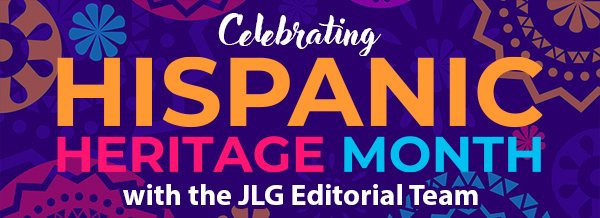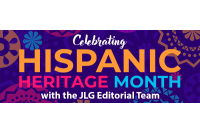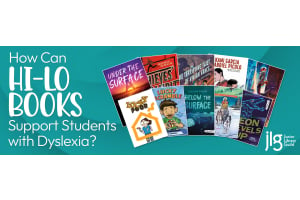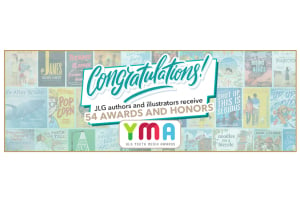Celebrating Hispanic Heritage Month with JLG Editorial Members!


To celebrate Hispanic Heritage Month, we are honoring not only our wonderful Hispanic authors, illustrators, and book creators, but also recognizing our esteemed Editorial Team members for selecting the most authentic, inclusive, and accessible Spanish literature for our readers! Learn more about how our editorial team selects the best books for our Spanish categories, why preserving our cultural identities is so important, and how readers can get involved in Hispanic Heritage Month!
Thank you to Deverly Perez, Editorial Assistant at JLG and Marian Hernandez, Editorial Assistant at JLG for writing and fully translating this special blog!
Para celebrar el Mes de la Herencia Hispana, honramos a no solo nuestros maravillosos autores e ilustradores hispanos sino también reconocemos a nuestros distinguidos miembros de nuestro equipo editorial por seleccionar la literatura en español más autentica, inclusiva y accesible para nuestros lectores. Aprende más sobre como nuestro equipo editorial selecciona los mejores libros para nuestras categorías en español, porque es tan importante preservar nuestras identidades culturales y como los lectores pueden involucrarse en el Mes de la Herencia Hispana.
Q: Tell us about yourself! What categories do you read for at JLG?
MH: Aside from the Spanish categories, I read for our older nonfiction categories—Biography Middle, Biography High and Nonfiction High. I also read for the older sports categories—Sports Middle and Sports High and I assist with the general Y (Young Adult) category.
The best part about my job is knowing the books we select will make a difference in children’s lives. When looking at the nonfiction categories, we often select titles that are relevant to global and national issues. Knowing that these books—consisting of strong writing and evidence-based approaches—are out there for readers to consume and help them form their own opinions outside of the standard curriculum is invaluable.
I became passionate about literature at a young age. Books helped me learn English and build my foundation of the language; this also allowed me to help my parents. As I matured, my passion for books evolved into writing and editing, and at the heart, I feel like literature is a medium to give a voice to those who historically and statistically are not given one.
Fun facts: I have two dogs and a cat. I recently moved from Florida to Cleveland, Ohio. I was born in Caracas, Venezuela.
DP: I was born in Tijuana, Mexico but moved to Houston, TX halfway through kindergarten. I lived on the east coast throughout my college years but love Houston so much I couldn’t stay away! I’ve been back home since around the same time I started working as an editorial assistant at JLG a little over a year and a half ago. I read for the elementary nonfiction categories, early readers/chapter books, as well as all three of our Spanish categories. My favorite part of this job is having the ability to read books from a wide range of publishers, getting a sort of first look at what will be available to readers in the future. We read months if not years ahead of publication and only select a few books per category, so reading books from as many publishers as we can helps us know we are picking the best of the best. Also, I really appreciate reading for the Spanish categories and knowing that my work is giving kids like young-me access to great quality books in Spanish. A fun fact about me is that my favorite book of all time is Frankenstein by Mary Shelley! The book is a bit weird, but once you get past the old-timey language, it’s so intense and emotional and I really connected with the “creature” as a young teen.
Cuéntame de ti! ¿Cuáles categorías lees para JLG?
MH: Yo nací en Caracas, Venezuela, llegué desde pequeña a los Estados Unidos específicamente al estado de la Florida donde viví la mayor parte de mi vida. Recientemente me mude a Cleveland en el estado de Ohio. Tengo dos perros y un gato.
Aparte de las categorías en español también leo las de no ficción para adolescentes. Estos incluyen biografías para los niños en la clase intermedia y secundaria (Biography Middle y Biography High). Además, leo las categorías de deportes para niños en la secundaria e intermedia, también ayudo con la categoría de ficción y no ficción general para adolescentes en la secundaria.
La mejor parte de mi trabajo es saber que los libros que seleccionamos van a imponer una diferencia en la vida de los niños. En relación con la categoría de no ficción usualmente seleccionamos títulos que son relevante con relación a la problemática nacional y global. Sabiendo que estos libros están basados en evidencia escrita los ponemos a disposición de los lectores así ellos mismos pueden formar sus propias opiniones por fuera del pénsum estándar, esto es inestimable.
Mi pasión por la lectura empezó a una edad muy temprana, los libros me ayudaron aprender el idioma inglés y a sentar la base del idioma; y esto a su vez me permitió ayudar a mis padres. A medida que fui madurando mi pasión por los libros evoluciono hacia la escritura y edición y en ese momento mi corazón sintió que la literatura es el medio de darle voz a esas personas que histórica y estadísticamente no se les da la oportunidad.
DP: Nací en Tijuana, México, pero me mudé a Houston, TX a la mitad del año escolar en el kínder. Viví en la costa este del país durante mis años universitarios, ¡pero amo tanto a Houston que no pude quedarme lejos por mucho tiempo! Regresé a vivir a casa casi al mismo tiempo que comencé a trabajar como asistente editorial en JLG, hace poco más de un año y medio. Yo leo para las categorías de no ficción de primaria, lectores/libros de capítulos principiantes, y también nuestras tres categorías en español. Mi parte favorita de este trabajo es leer libros de una amplia selección de casas editoriales, obteniendo un primer vistazo a lo que estará disponible para los lectores en el futuro. Nosotros leemos libros meses, sino años, antes de su publicación y solo seleccionamos unos cuantos, por categoría, por eso leer libros de la mayor cantidad de editoriales como podamos nos ayuda a saber que estamos eligiendo lo mejor de lo mejor. También aprecio mucho leer para las categorías en español, sabiendo que mi trabajo le brinda a niños como yo acceso a libros en español de gran calidad. ¡Un dato curioso sobre mí es que mi libro favorito de todos los tiempos es Frankenstein! Es un poco raro, pero una vez que superas el lenguaje anticuado, el cuento es muy emotivo y yo realmente conecté con la "criatura" cuando era adolescente.
Q: Why is it important for more books written in Spanish to be on shelves in the library? What does this do for learners? Why should we empower learners with these books? Did you have books like this on your library shelves?
MH & DP: There’s a huge audience of Spanish speakers who would benefit from seeing more Spanish books in libraries. Spanish is the second most spoken language not only in the United States, but globally. It’s important to discuss how available these books are to Spanish readers as well as distinguishing between the access to these books in schools versus libraries. Schools, for instance, are more likely to stock books that are curriculum-focused, whereas libraries can include books that are for entertainment and that kids will gravitate towards on their own. Aside from the general appeal, including more Spanish books is empowering and allows readers to see themselves reflected in the media they consume! Including more Spanish books in which readers can relate to enables their own self-discovery and exploration.
MH: Growing up in Florida, I had the privilege of attending an elementary school which offered a Two-Way Dual Language program. I attended classes for half the day in Spanish and the other half of the day in English. The majority of states may not offer programs such as these, which in turn could make Spanish speakers feel more isolated. I would have benefitted from having books written in Spanish stocked in my library—even after elementary school. The Spanish section in my local library were mostly adult books, so it’s important to broaden selections and make them more diverse.
DP: Similarly, growing up in Houston, I was lucky that Texas is one of only a few states that require public schools to offer either bilingual or ESL programs depending on the grade levels served. During my first three years of school, my classes were taught completely in Spanish, so there were books in Spanish available for me to read. While I am appreciative of having access to books in my native language, the stories which were available to me at the time did not feature characters and situations that I was able to relate to. I think giving children access to a wide range of books of different topics where they can see themselves reflected is a valuable way of making Spanish speakers feel seen.
Lectura y selección para las categorias en español: ¿Por qué es importante que haya más libros escritos en español en los estantes de la biblioteca? ¿Qué aporta esto a los estudiantes? ¿Por qué deberíamos empoderar a los estudiantes con estos libros? ¿Tenían libros como estos en los estantes de tu biblioteca?
MH & DP: Hay una gran audiencia de hispanohablantes que se beneficiarían si vieran más libros en español en las bibliotecas. El español es el segundo idioma más hablado no sólo en los Estados Unidos, sino a nivel mundial. Es importante discutir qué tan disponibles son estos libros para los lectores, así como distinguir entre el acceso a estos libros en las escuelas a comparación de las bibliotecas. Es más probable que las escuelas tengan libros centrados en el plan de estudios, mientras que las bibliotecas pueden incluir lectura para el entretenimiento y libros a los que los niños gravitarán hacía por sí solos. Aparte del interés común, incluir más libros en español es empoderante y permite a los lectores verse reflejados en los medios que consumen. Incluir más libros en español con los que los lectores puedan identificarse permite su propio autodescubrimiento y exploración.
MH: Creciendo en la Florida, tuve el privilegio de asistir a una escuela primaria que ofrecía un programa bilingüe. Asistía a clases la mitad del día en español y la otra mitad del día en inglés. Es posible que la mayoría de los estados no ofrezcan programas como éste, lo que a su vez podría hacer que los hispanohablantes se sintieran más aislados. Me habría beneficiado de tener libros escritos en español en mi biblioteca, incluso después de la escuela primaria. La sección en español de mi biblioteca local estaba formada principalmente por libros para adultos, por lo que es importante ampliar las selecciones y hacerlas más diversas.
DP: De manera similar, al crecer en Houston, tuve la suerte de que Tejas sea uno de los pocos estados que exige que las escuelas públicas ofrezcan programas bilingües o de ESL (inglés como segundo idioma), dependiendo en los grados atendidos (que sirven). Durante mis primeros tres años de escuela, mis clases se daban completamente en español, por lo que tenía acceso a libros en español para leer. Aunque estoy muy agradecida de tener libros en mi lengua materna disponibles en la escuela, la mayoría de ellos fueron escritos originalmente en inglés y luego traducidos al español, por lo que muchas veces no presentaban personajes o situaciones con las que pudiera identificarme. Por eso, creo que darle a los niños acceso a una amplia selección de libros sobre diferentes temas donde se puedan ver reflejados es una manera valiosa de hacer que los hispanohablantes se sientan vistos.
Q: JLG selects both Spanish books and translations of books; For readers who don’t know, what’s the difference? Why is it important?
MH & DP: Our goal is to select books written in a Spanish that are accessible to the United States Spanish-speaking audience. We look for books that use Spanish that is appropriate to the setting and characters of the book. We also want to make sure that this literature can be accessible to the intended audience. We often read Spanish books that we also received in English, so we carefully evaluate the texts side by side to check for accurate, authentic translations that capture the original connotations, rhythm, and tone that sometimes can be lost in translation. If a story takes place in a specific Spanish-speaking country, the translation is especially important, even if the dialect is not as commonly used in the U.S.
JLG selecciona libros escritos en español y libros traducidos de inglés, para lectores que lo saben, ¿cuál es la diferencia? ¿Por qué es importante?
MH & DP: Nuestro objetivo es seleccionar libros escritos en español que sean accesibles a la audiencia hispanohablante de los Estados Unidos. Buscamos libros que utilicen un español apropiado para el escenario y los personajes del libro. También queremos asegurarnos de que esta literatura sea accesible al público al que va dirigida. A menudo leemos libros en español que también recibimos en inglés, por lo que evaluamos cuidadosamente los textos uno al lado del otro para asegurar si son traducciones precisas y auténticas que captan las connotaciones, el ritmo y el tono original que a veces pueden perderse en la traducción. Si una historia se desarrolla en un país hispanohablante especifico, la traducción es especialmente importante, aunque el dialecto no sea tan común en Estados Unidos.
Q: What themes, concepts, tones, or other qualities do you look for when selecting a book?
MH & DP: Our main priorities in selecting titles for our Spanish categories are child appeal, quality, and authenticity of representation and language. Children’s interest and enjoyment while reading is paramount. Many books published in Spanish focus on serious and important topics that aren’t always immediately appealing to readers. We select high-quality books that reflect a reader’s life experience, as well as fun titles that reluctant readers will want to pick up.
Our readers’ early evaluation and careful analysis often affords us the opportunity to provide feedback about a particular Spanish term or portrayal of an experience or character to publishers prior to publication. It is rewarding when our input helps to improve books for all readers!
¿Qué temas, conceptos, tonos u otras cualidades buscan cuando seleccionan un libro?
MH&DP: Nuestras prioridades principales a la hora de seleccionar títulos para nuestras categorías en español son el interés infantil, la calidad y la autenticidad de la representación y el idioma. El interés y el entretenimiento de los niños al leer es primordial. Muchos libros publicados en español se centran en temas serios e importantes que no siempre son inmediatamente atractivos para los lectores. Seleccionamos libros de alta calidad que reflejan las experiencias cotidianas del lector, así como títulos divertidos que los lectores reacios querrán escoger. Nuestra evaluación temprana y nuestro análisis meticuloso nos brindan a menudo la oportunidad de hacer llegar a las casas editoriales nuestra opinión sobre la elección de palabras o el dialecto español utilizado, así como sobre el retrato de una experiencia o un personaje, antes de la publicación de un libro. Es gratificante cuando nuestras aportaciones ayudan a mejorar los libros para todos los lectores.
Q: What grade levels do you enjoy reading the most?
MH: I enjoy reading Spanish Middle grade the most. My dual language program ended in fifth grade, so when I began middle school, it became significantly harder to find books in Spanish. Reading and selecting books in this older category is important to me because I did not have access to these books, and I want others to have that opportunity. Helping get these titles into libraries and schools feels like a major accomplishment!
DP: I spend most of my days reading back-to-back picture books, so I really enjoy reading for SPM, Spanish middle grade, which is our oldest category and includes a mix of middle grade chapter books and some older novels. These longer stories don’t only offer me a change of pace, but also tackle issues relevant to Spanish-speaking communities that aren't covered as often in English literature, especially that taught in schools.
¿Para qué grados disfrutas más leer?
DP: Paso la mayor parte de mis días leyendo libros ilustrados uno tras otro, por lo que realmente disfruto leer para SPM, la categoría de español de grado medio (secundaria), la cual es para nuestros lectores mayores e incluye una combinación de libros de capítulos y novelas para grados intermedios (de grado medio). Estas historias son más largas y no sólo me ofrecen un cambio de ritmo, sino que también tratan con temas relevantes para las comunidades hispanas que no son cubiertos con tanta frecuencia en la literatura en inglés, especialmente la que se enseña en las escuelas.
MH: Lo que más me gusta es leer español de grado medio. Mi programa de dual terminó en quinto grado, así que cuando empecé la enseñanza media, me resultó mucho más difícil encontrar libros en español. Leer y seleccionar libros de esta categoría de mayor edad es importante para mí porque yo no tuve acceso a estos libros, y quiero que otros tengan esa oportunidad. Ayudar a que estos títulos lleguen a las bibliotecas y a las escuelas es un gran logro.
Q: What is your connection to Hispanic Literature? What is the importance of celebrating your cultural identity?
MH: I think it’s incredibly important to celebrate Hispanic culture. Specifically, I think it’s important to distinguish different cultures within the umbrella category of “Hispanic.” I come from a country which a lot of people don’t understand and classify as “dangerous”, but there’s beauty in our culture and our history which deserves to be highlighted.
DP: By the time I learned to speak English, I already knew how to read and write Spanish, so to me, reading in my native tongue has always been special; it not only brings me comfort but also allows me to connect with others through our shared cultural experiences.
¿Cuál es tu conexión a la literatura hispánica? ¿Cuál es la importancia de celebrar tu identidad cultural?
MH: Creo que es increíblemente importante celebrar la cultura hispana. En concreto, creo que es importante distinguir las diferentes culturas dentro de la categoría general de "hispano". Vengo de un país que mucha gente no entiende y clasifica como "peligroso", pero hay belleza en nuestra cultura y nuestra historia que merece ser destacada.
DP: Cuando aprendí a hablar inglés, ya sabía leer y escribir en español, por eso leer en mi lengua materna siempre ha sido especial; no es solamente algo reconfortante, sino que también me permite conectar con otros a través de nuestras experiencias culturales compartidas.
Q: What is the importance of authentic representation in literature?
MH & DP: When evaluating a text, we look at multiple elements like the authenticity of the Spanish spoken/ translation and the characters, storyline and plot. For example, if a story takes place in a specific Spanish-speaking country, the translation is especially important, even if the dialect is not as commonly used in the U.S Including Spanglish, dialects and culturally accurate slang is also something we consider when reading for the Spanish categories. Likewise, are the characters dimensional? Does the author avoid generalizing or stereotyping? Illustrations are also especially important in the Primary Spanish (K-3) and Elementary Spanish (3-5) categories. The artwork can add an extra layer of meaning or a reference that connects the story to a broader tradition. We evaluate illustrations to ensure that they respectfully and accurately portray characters and their cultures. For example, in El día del agua (Water Day) by Margarita Engle, illustrated by Olivia Sua, which takes place in Cuba, there are characters with a range of skin tones and hair types, representative of the diversity of the people of Cuba.
¿Cuál es la importancia de la representación auténtica en la literatura?
MH & DP: Cuando evaluamos un texto, nos fijamos en varios elementos, como la autenticidad del español hablado/traducido y los personajes, la historia y la trama. Por ejemplo, si un cuento toma lugar en un país hispanohablante especifico, la traducción es especialmente importante, aunque el dialecto no sea tan común en EE.UU. La inclusión del spanglish, dialectos y el español coloquial es algo que también tomamos en cuenta cuando leemos para las categorías de español. Asimismo, nos preguntamos, ¿tienen los personajes dimensión? ¿Evita el autor generalizar o estereotipar? Las ilustraciones también son especialmente importantes en las categorías de español infantil (K-3) y español de primaria (3-5). Las ilustraciones pueden añadir un significado adicional o una referencia que conecta la historia a una tradición compartida. Evaluamos las ilustraciones para asegurarnos de que tratan con respeto y cuidado a los personajes y sus culturas. Por ejemplo, en «El día del agua», escrito por Margarita Engle e ilustrado por Olivia Sua, que transcurre en Cuba, hay personajes con distintos tonos de piel y tipos de pelo, representativos de la diversidad del pueblo cubano.
Q: Why do you feel so compelled to share the best Spanish literature with readers?
MH: I think Hispanic people are largely underrepresented in mainstream media, so selecting characters which are authentic and relatable is imperative. Everyone wants to see a part of themselves in the media they consume, and Spanish readers deserve books which are not only educative, but fun and realistic too!
DP: Because they deserve it! Readers should have access to strong and impactful literature despite the language they read in. English is a challenging language for Spanish speakers to learn, and not having access to any literature in your native language can lead kids to feel insecure about their reading ability and educational progress.
¿Por qué se sienten tan apasionadas a compartir la mejor literatura en español con los lectores?
DP: ¡Porque se lo merecen! Los lectores deben tener acceso a literatura impactante y de buena calidad independientemente del (sin importar el) idioma en el que lean. El inglés es un idioma difícil de aprender para los hispanohablantes, y si ellos no tienen literatura en su idioma nativo disponible, eso puede hacer que los estudiantes se sientan inseguros acerca de su habilidad de lectura y progreso educativo.
MH: Creo que los hispanos están muy poco representados en los medios de comunicación, por lo que es imprescindible seleccionar personajes auténticos y cercanos. Todo el mundo quiere ver una parte de sí mismo en los medios que consume, y los lectores españoles merecen libros que no sólo sean educativos, sino también divertidos y realistas.
Q: How has your heritage influenced your career?
MH: I would say that my heritage has influenced how I perceive my career, more than it has directly impacted it. Because I grew up with certain language barriers, my education looked a little different than someone who is not part of an ethnic minority. It pushed me to a field where I felt underestimated or undervalued, and those negative feelings propelled me to make a positive impact for the next generation!
DP: Because I became bilingual at such an early age, I’ve always had a fascination with words and so I knew that I wanted to do something with reading and writing. After being away from my cultural traditions while in college in Connecticut, I began to really understand the value that Spanish has had in my life. I reconnected with my native tongue after graduation and wanted to be somewhere where I could utilize my language skills daily. My job now combines both of my passions—reading and my language.
¿Qué efecto ha tenido tu herencia cultural en tu carrera?
DP: Debido a que he sido bilingüe desde muy joven, siempre me han fascinado las palabras y por eso supe desde pequeña que quería trabajar en algo que tuviera que ver con la lectura y la escritura. Después de estar alejada de mis tradiciones culturales mientras atendía a la universidad en Connecticut, comencé a realmente comprender el valor que el español ha tenido en mi vida. Después de mi graduación, pude reconectarme con mi lengua nativa y realmente quería trabajar en un lugar donde pudiera utilizar mis habilidades lingüísticas a diario. Ahora, mi carrera combina dos de mis mayores pasiones: la lectura y mi idioma.
MH: Yo diría que mi herencia ha influido en cómo percibo mi carrera, más de lo que ha influido directamente en ella. Como crecí con ciertas barreras lingüísticas, mi educación fue un poco diferente a la de alguien que no forma parte de una minoría étnica. Me empujó a un campo en el que me sentía subestimada y muy poco valorada, y esos sentimientos negativos me impulsaron a tener un impacto positivo para la próxima generación.
Q: Why is it important to celebrate Hispanic Heritage Month? Why is it important to empower and uplift Hispanic voices, culture, history, and contributions?
MH & DP: Celebrating Hispanic Heritage month offers a time to acknowledge cultural origins and express gratitude for how far we have come as a society. For so long, Spanish was suppressed and not allowed to be spoken within the United States. Likewise, people of Hispanic descent were discriminated against, forced to assimilate, and grouped together. Now, we can celebrate each nation of Hispanic descent instead of being hidden, forgotten, or suppressed. There is a common misconception that Hispanic Heritage Month is only during September. However, it runs from Sept 15th to Oct 15th. This is to honor the date of independence of Mexico, Costa Rica, Honduras, El Salvador, Guatemala, and Nicaragua. As well as other nations such as Chile who gained independence on the 18th of September and Belize who gained independence on Sept 21st. It allows people to show patriotism and celebrate their heritage as a community, even while not being physically in that country.
¿Por qué es importante celebrar el Mes de la Herencia Hispana? ¿Por qué es importante empoderar y elevar las voces, cultura, historia y contribuciones hispanas?
MH & DP: La celebración del mes de la Herencia Hispana ofrece un momento para reconocer los orígenes culturales y expresar gratitud por lo lejos que hemos llegado como sociedad. Durante mucho tiempo, el español fue suprimido y no se permitió que se hablara en Estados Unidos. Asimismo, las personas de ascendencia hispana fueron discriminadas, obligadas a asimilarse y reducidas a una sola identidad etnia. Ahora, podemos celebrar cada nación hispana en lugar de que sea ocultada, olvidada o suprimida. Existe la idea errónea de que el Mes de la Herencia Hispana sólo se celebra en septiembre. Sin embargo, ocurre del 15 de septiembre al 15 de octubre. Esto es para honrar la fecha de la independencia de México, Costa Rica, Honduras, El Salvador, Guatemala y Nicaragua. Además de otras naciones como Chile, que se independizó el 18 de septiembre, y Belice, que lo hizo el 21 de septiembre. Permite a la gente mostrar patriotismo y celebrar su herencia como comunidad, incluso sin estar físicamente en ese país.
Q: How can we make these actions more of our everyday lives, and not just limited to one month?
MH & DP: It’s important to take the initiative to educate yourself about underrepresented communities, but we must also learn how to distinguish different countries and cultures. For example, while Hispanic people come together to communally show support for their shared heritage, it is equally as important to recognize each nation which is classified as Hispanic. Avoiding grouping these cultures as one and researching the origins and significance of Hispanic Heritage Month is one way to be an active learner and find ways to honor different cultures and heritages every day of the year. On a daily basis, we must urge people to be open and accepting versus being tolerant. Being willing to un-learn some common misconceptions and stereotypes is also important. Not taking offense to a correction of these widely distributed misconceptions as they are commonly portrayed in the media. Consuming authentic Hispanic media such as listening to playlists, podcasts and shows which are curated or produced by Hispanic people. For example, check out Apple Music’s playlists like Dale Play which feature Latin artists. Visit local or family-owned restaurants for Latin cuisine instead of national or regional chain restaurants.
¿Cómo podemos hacer que estas acciones sean más parte de nuestra vida diaria y no se limiten a solo un mes?
MH & DP: Es importante tomar la iniciativa de educarse sobre las comunidades infrarrepresentadas, pero también debemos aprender a distinguir entre los distintos países y culturas. Por ejemplo, aunque los hispanos se reúnen para mostrar comunitariamente su apoyo a la herencia que comparten, es igualmente importante reconocer a cada nación que se clasifica como hispana. Evitar agrupar estas culturas e investigar los orígenes y el significado del Mes de la Herencia Hispana es una forma de activamente aprender y encontrar maneras de honrar a diferentes culturas y herencias todos los días del año. A diario debemos instilar a la gente a tener una mente abierta y ser aceptante en vez de ser intolerante. También es importante estar dispuesto a desaprender algunas ideas equivocadas y estereotipos comunes. No ofenderse ante una corrección de estos conceptos erróneos distribuidos ampliamente y de la manera que se presentan habitualmente en los medios de comunicación. Consumir medios hispanos auténticos, como escuchar música, podcasts y programas que fueron elaborados o producidos por creadores hispanos. Por ejemplo, hay listas de reproducción en Apple Music, como ¡Dale Play!, las que son protagonizadas por artistas latinos. Puedes visitar restaurantes locales o familiares de cocina latina en lugar de cadenas de restaurantes nacionales o regionales.
Q: Hispanic Heritage Month 2023 theme is: Driving Prosperity, Power, and Progress in America; how do we see this illustrated in current literature? Could we do a better job at it?
MH & DP: We have recently seen how Hispanic authors have been given the space to prosper by publishers. The number of books by Hispanic authors being published has significantly risen over the years as well as translation. We’re also seeing books published concurrently in Spanish and English as well as titles which have only been historically published in English now being translated into Spanish. Additionally, we are also seeing more Hispanic people being employed as Hispanic authors increase. Having people who have a connection to the culture and who serve as an advocate for what books are being chosen and put out for the world to see is important.
El tema del Mes de la Herencia Hispana 2023 es: Impulsando prosperidad, poder y progreso en Estados Unidos; ¿Cómo podemos ver esto ilustrado en la literatura actual? ¿Podríamos hacerlo de una manera mejor?
MH & DP: Recientemente hemos visto cómo los autores hispanos pueden prosperar en los espacios creados recientemente por las casas editoriales. El número de libros escritos por autores hispanos que llegan a ser publicados ha aumentado significativamente a lo largo de los años, igual que la cantidad de libros escritos en ingles que luego son traducidos a español. También hemos notado un aumento de libros publicados simultáneamente en español e inglés, así como títulos antiguos o clásicos escritos en inglés que ahora han sido traducidos al español. También estamos viendo cómo se emplea a más gente hispana involucrada en el proceso de publicación especialmente a medida que aumentan los autores hispanos. Es importante que personas que tienen una conexión a la cultura hispana sean portavoces de los libros que se eligen y se ponen a disposición del mundo.
Q: How can readers celebrate Hispanic Heritage Month? What titles can they read?
MH & DP: One of our recent selections, Spanish is the language of my family, features a story about Spanish being suppressed, which is relevant given the significance and history being Hispanic Heritage month. We also have lots of other Spanish selections which feature authentic Hispanic characters and stories in our Spanish categories. If you prefer to read in English, our Multicultural Elementary category also features some Hispanic authors, stories, and characters.
Looking through our JLG Spanish selections is a good starting point! School Library Journal also wrote an excellent article which features Latinx publishers. You can read that article here.
¿Cómo pueden los lectores celebrar el Mes de la Herencia Hispana? ¿Qué títulos pueden leer?
MH & DP: Una de nuestras selecciones más recientes, «El español es la lengua de mi familia», es un cuento sobre la supresión del español, lo cual es relevante dado el significado y la historia del Mes de la Herencia Hispana. También tenemos muchas otras selecciones en español que presentan personajes e historias auténticamente hispanas en nuestras categorías en español. Si prefieres leer en inglés, nuestra categoría Multicultural Primaria (MCE) también incluye algunos autores, historias y personajes hispanos.
Puedes navegar la página web de JLG para ver nuestras selecciones en español que proveen varias opciones por dónde empezar. School Library Journal también ha escrito un excelente artículo sobre las casas editoriales latinas. Puedes leer el artículo aquí: https://www.slj.com/story/Independent-Publishers-Meet-Demand-for-Latinx-Books-for-Kids.
What upcoming titles are you excited about that JLG members will see soon/ have recently seen in the Spanish categories?
MH & DP: Spanish is the Language of my Family was selected in both Spanish and English and is an exciting new title. We are also excited for The Light Sculptors by Margarita Engle. This is another title which was selected in both English and Spanish. Lastly, Iveliz lo explica todo by Andrea Beatriz Arango is a recent selection in Spanish which is very authentic. When published in English, it received the Newbery Honor Award winner.
De los títulos que los miembros de JLG verán pronto o han visto recientemente en las categorías en español, ¿Cuáles las entusiasman más?
MH & DP: «El español es la lengua de mi familia» fue seleccionado tanto en español como en inglés y es un título recientemente publicado y emocionante. También estamos entusiasmadas por «Las escultoras de la luz» por Margarita Engle. Este es otro título que fue seleccionado en inglés y español. Por último, «Iveliz lo explica todo» por Andrea Beatriz Arango, es otra reciente selección en español muy auténtica. Cuando se publicó en inglés, recibió el Newbery Honor Award.
Q: What is your favorite book authored/illustrated by a creator who is Hispanic?
MH: Doña Barbara by Romulo Gallegos and La hija de la española by Karina Sainz Borgo (It would be night in caracas is the English title)
DP: Anything Sandra Cisneros! Especially her poetry, my favorite collection of hers is Loose Woman. (I mostly read poetry for fun, but I recently read You Sound Like a White Girl: The Case for Rejecting Assimilation by Julissa Arce and WOW)
¿Cuál es tu libro favorito escrito/ilustrado por un creador hispano?
DP: ¡Lo que sea de Sandra Cisneros! Especialmente su poesía, mi colección favorita de ella es Loose Woman. (en mi tiempo libre leo principalmente poesía, pero recientemente leí You Sound Like a White Girl: The Case for Rejecting Assimilation por Julissa Arce y WOW).
MH: «Doña Barbara» por Romulo Gallegos y «La hija de la española» por Karina Sainz Borgo
Q: Do you have any Hispanic Heritage Month resources you’d like to share?
- Hispanic Heritage Month official link
- Explore podcasts that are being highlighted under "Hispanic Heritage Month" tab
- Penguin Random House has a great list
¿Algunos recursos del Mes de la Herencia Hispana que les gustaría compartir? (¿Tienen algún recurso del Mes de la Herencia Hispana que les gustaría compartir?)
MH & DP:
- Enlace oficial del Mes de la Herencia Hispana: https://www.hispanicheritagemonth.gov/
- Explora los podcasts destacados en la sección del Mes de la Herencia Hispana en tu aplicación favorita.
- Penguin también tiene una gran lista a continuación: https://penguinrandomhousehighereducation.com/2023/08/03/latinx-and-hispanic-heritage-month/










